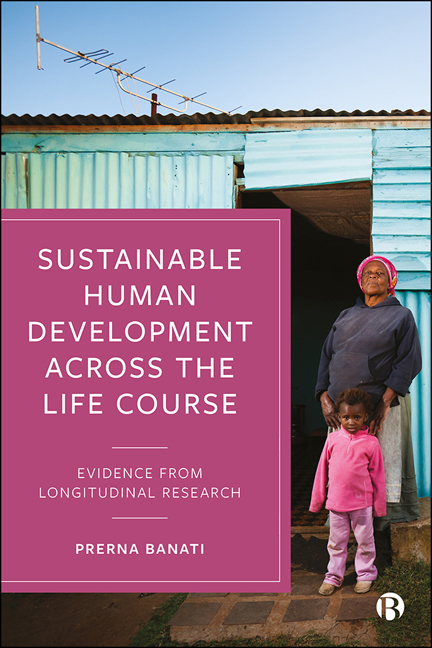Book contents
- Frontmatter
- Dedication
- Dedication
- Contents
- List of Figures, Tables and Boxes
- Notes on Contributors
- Foreword: Understanding and Enhancing Human Development Among Global Youth – On the Unique Value of Developmentally Oriented Longitudinal Research
- Introduction: Measuring Sustainable Human Development Across the Life Course
- 1 Exploring the Potential for Gender Norm Change in Adolescent Girls: Evidence from ‘Real Choices, Real Lives’ Longitudinal, Qualitative Study Data
- 2 Unequal Educational Trajectories: The Case of Ethiopia
- 3 Early Life Transitions Increase the Risk for HIV Infection: Using Latent Class Growth Models to Assess the Effect of Key Life Events on HIV Incidence Among Adolescent Girls in Rural South Africa
- 4 Achieving the Sustainable Development Goals: Evidence from the Longitudinal Parenting Across Cultures Project
- 5 Achieving Gender Equality: Understanding Gender Equality and Health Among Vulnerable Adolescents in the Sustainable Development Goals Era
- 6 Capturing the Complexities of Adolescent Transitions Through a Mixed Methods Longitudinal Research Design
- 7 Child Well-being Across the Life Course: What Do We Know, What Should We Know?
- 8 Mauritian Joint Child Health Project: A Multigenerational Family Study Emerging from a Prospective Birth Cohort Study: Initial Alcohol-related Outcomes in the Offspring Generation
- Conclusion: The Future of Longitudinal Research
- Index
6 - Capturing the Complexities of Adolescent Transitions Through a Mixed Methods Longitudinal Research Design
Published online by Cambridge University Press: 05 January 2022
- Frontmatter
- Dedication
- Dedication
- Contents
- List of Figures, Tables and Boxes
- Notes on Contributors
- Foreword: Understanding and Enhancing Human Development Among Global Youth – On the Unique Value of Developmentally Oriented Longitudinal Research
- Introduction: Measuring Sustainable Human Development Across the Life Course
- 1 Exploring the Potential for Gender Norm Change in Adolescent Girls: Evidence from ‘Real Choices, Real Lives’ Longitudinal, Qualitative Study Data
- 2 Unequal Educational Trajectories: The Case of Ethiopia
- 3 Early Life Transitions Increase the Risk for HIV Infection: Using Latent Class Growth Models to Assess the Effect of Key Life Events on HIV Incidence Among Adolescent Girls in Rural South Africa
- 4 Achieving the Sustainable Development Goals: Evidence from the Longitudinal Parenting Across Cultures Project
- 5 Achieving Gender Equality: Understanding Gender Equality and Health Among Vulnerable Adolescents in the Sustainable Development Goals Era
- 6 Capturing the Complexities of Adolescent Transitions Through a Mixed Methods Longitudinal Research Design
- 7 Child Well-being Across the Life Course: What Do We Know, What Should We Know?
- 8 Mauritian Joint Child Health Project: A Multigenerational Family Study Emerging from a Prospective Birth Cohort Study: Initial Alcohol-related Outcomes in the Offspring Generation
- Conclusion: The Future of Longitudinal Research
- Index
Summary
Introduction
Adolescence is a time of rapid change, not only in physical, cognitive and psychological competencies but also in social roles and expectations (Patton et al, 2012; Steinberg, 2015; Viner et al, 2015). Yet we still know relatively little about the patterning of these changes, and the types of support young people need in order to reach their full human capabilities (Patton et al, 2016). Given that many of the Sustainable Development Goals (SDGs) rest on investments in adolescents (Sheehan et al, 2017) – from eliminating harmful traditional practices (including child marriage and female genital mutilation) to ensuring quality education and training – investing in a more robust evidence base and improved measurement is critical.
The Gender and Adolescence: Global Evidence (GAGE) research programme addresses these evidence and measurement gaps. This chapter discusses the design and methodological choices made by the GAGE study – to date, the largest longitudinal study (covering nine years, 2015–24) focusing on adolescents (10–19 years) in the Global South. GAGE is following 18,000 adolescent girls and boys in three regions: East Africa, the Middle East and North Africa (MENA) and South Asia. Using mixed methods, the study is weaving together survey findings from adolescents and their caregivers with in-depth qualitative research with adolescents, caregivers and siblings, as well as community leaders, service providers and policy officials.
This chapter highlights key features of GAGE's longitudinal design: (1) working with two distinct age cohorts (younger adolescents aged 10–12 and older adolescents aged 15–17) to capture the dynamism of this life stage; (2) involving girls and boys to explore gender dynamics; (3) surveying primary female caregivers to understand intergenerational dynamics; (4) purposely sampling disadvantaged adolescents (those who married early, have a disability, or are internally displaced or refugees); and (5) working across diverse geographies (urban, rural, pastoralist, refugee camps) to understand the role of livelihood options, service access and infrastructural factors in shaping adolescent trajectories.
GAGE's approach was informed by the need to address questions around adolescent experiences and perceptions, alongside questions on the impact of policies and programmes in mediating these experiences. The research design twins observational longitudinal research across six key capability domains closely linked to the SDGs (education and learning; bodily integrity and freedom from violence;
- Type
- Chapter
- Information
- Sustainable Human Development across the Life CourseEvidence from Longitudinal Research, pp. 135 - 164Publisher: Bristol University PressPrint publication year: 2021



